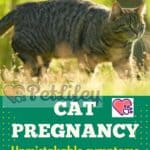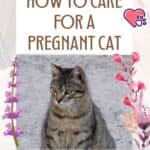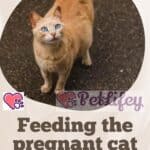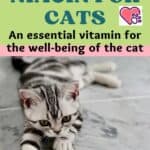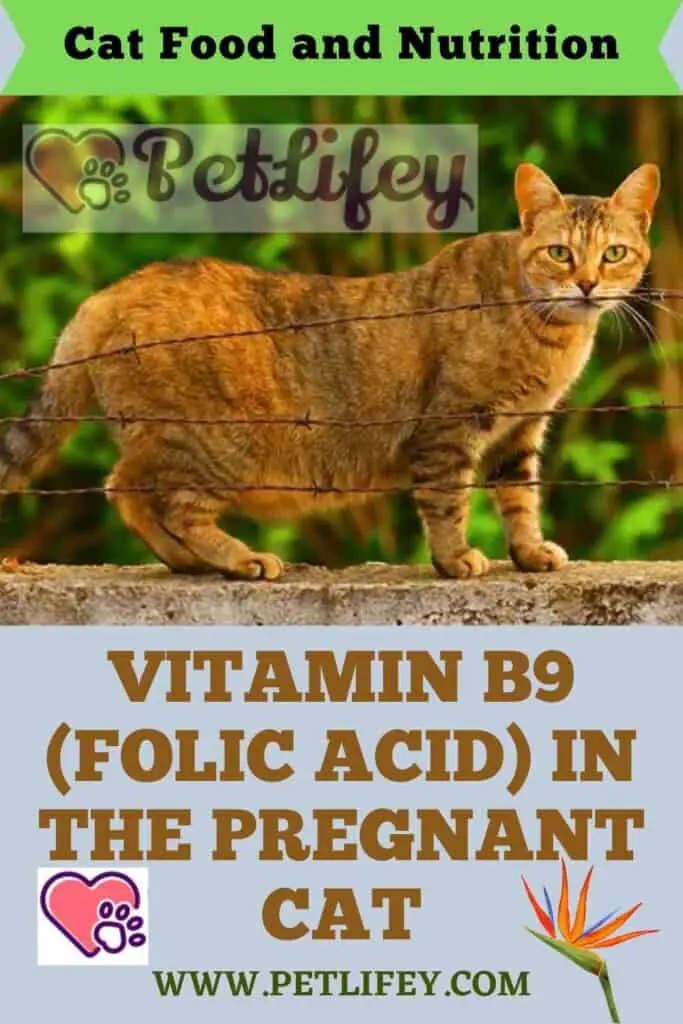
The pregnant cat needs a lot of nutrients. But what are the risks to pregnancy if folic acid is deficient?
We know that folic acid (vitamin B9) is very important in pregnancy, both for women and for cats. It is necessary to know how it can influence gestation, how to administer it to our cat and which foods that contain it to include in her diet.
What is it and why is it important in pregnancy?
Folic acid or vitamin B9 is a water-soluble vitamin. Cats do not produce it in sufficient quantities and it is advisable for them to get it through their diet.
It is a fundamental vitamin, part of the B vitamins, because it affects numerous processes at the cellular level, in every living being but especially in pregnancy.
We have always heard about, and a woman who wants to think about becoming pregnant or is already pregnant is recommended to use folic acid based supplements. But why?
Whether taken with food or acquired from specific supplements, vitamin B9 is then absorbed in the intestine in the cat: it is the duodenum where folate and folic acid enter the bloodstream to be stored in the liver.
Its presence in the organism is essential because at the base of the synthesis of DNA and RNA as well as of the primary cellular automatisms for life:
- It contributes to the formation of red blood cells (erythropoiesis).
- It is essential for the development of neuronal cells: not only in the brain but also in the entire spinal cord. A folic acid deficiency, during the development of the nervous system in pregnancy, manifests itself through the non-closure of the marrow and we would have spina bifida.
- It prevents congenital diseases such as anencephaly and encephalocele in cats or feline cleft palate.
- Prevents malformations of the kidney tubules or limbs.
- It keeps the plasma homocysteine level in the animal low, avoiding the risk of heart or blood vessel disease; prevents stroke.
- It has a strong anti anemic power.
- It helps in the development of the functions of the digestive system.
- It decreases the risk of diseases related to the circulatory system.
- It improves the functions of skin cells, making the skin more elastic and shiny.
As it has been shown that the need for folic acid increases during pregnancy, the vet will prescribe, in addition to a diet adapted to the condition, also supplements: the recommended dose for a pregnant cat is about 2.5 mg / day of acid. folic.
Since any excess of vitamin B9 for the cat would be eliminated through the urine without causing problems, it would be better to possibly exceed the dose than to risk that the cat is deficient.
A very low value of folic acid in the blood, despite its integration, shows that in the animal it is possible that there is a reduced or missed absorption in the intestine, in addition to possible interference with other pharmacological therapies.
Which cat foods contain folic acid?
We know that not all foods we include in our diet are also good for cats. We can say the same by comparing the dietary needs of a pregnant woman with those of a cat.
Many foods for a cat are harmful, even if they contain a huge amount of folic acid; therefore, however, we could not include them in the diet of our cat.
Without a doubt, a food rich in vitamin B9 is liver, which the cat can eat without any problem because it responds well to its nature as a carnivore.
Spinach and green leafy vegetables also contain a lot of folic acid: they are not essential in the cat’s diet. However, he could eat spinach, but in small quantities because it contains oxalic acid, a basic component of kidney stones, and the same goes for cabbage and broccoli.
Even in citrus fruits and dried fruit we can find a good dose of this vitamin: the problem for our cat is that, not only the smell of citrus fruits is unpleasant for her, but some could cause her to be poisoned.
Having eliminated the possibility of including citrus fruits in the diet of a pregnant cat, we are forced to discard dried fruit as well: much of this is even poison for a cat.
Legumes also contain folic acid, but these must be given sporadically because their risks for the Micia are greater than the benefits.
We know that cats don’t need carbohydrates in their diets, but we could occasionally give our mom-to-be some plain rice: it is in the outer layer of the rice grains that there is folic acid.
Recommendations
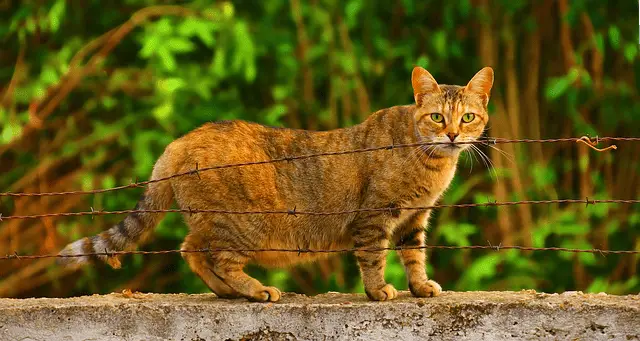
A cat during pregnancy undergoes many imbalances, hormonal first of all but also at the cellular level: it is necessary to produce more energy and therefore give it more nutrients, especially for the lives in formation.
For this the vet will explain to us that if our cat changes habits and behavior and everything will be normal even if her food tastes change. Be careful, however, not to stuff the animal, giving it an excessive weight gain which is certainly harmful.
Thinking about including folic acid in the diet, it is necessary to keep in mind any health problems in the cat: if she suffers from pancreatic diseases, liver disease or has renal failure, it is always advisable to follow the veterinarian’s instructions to the letter.
Regardless of a pregnancy condition, giving vitamin B9 is also useful when the vitamin B12 values in cats are below normal.
Today there are many supplements on the market that our veterinarian can recommend for Micia: they have also been studied in such a way as to be easily appetizing for her and also very digestible.
If we have chosen a natural diet for our cat, we must keep the levels of vitamin D and vitamin A in the cat under control: their dose is not easily quantifiable and therefore it could be risky to also associate multivitamins as it would risk hypervitaminosis.
However, like a woman who is thinking of a pregnancy has been taking folic acid for months before she can become pregnant, the same goes for the animal: it must be given the vitamin B9 supplement already during the cat’s heat period.
The important thing is to periodically bring the future mother to visit the vet, keep her blood values under control and provide not only for a suitable diet but also for proper hygiene: the body is still facing a great undertaking, it must be protected and strengthened its defenses.

